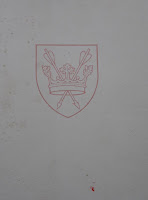*a little disclaimer*:
I’ve recently been criticised for the lousiness of my English. The critique wasn’t too harsh yet it stung a little. Hence I can’t say that I was very happy about that, on the other hand, what could I do to improve my linguistic abilities other than to execute them in any way possible—to be familiar solely with strings composed of words composed of letters etc.? After all, I’m not young and neither am I a super-quick learner, which is unfortunate. You can’t beat the oldie but the goodie “Repetitio est mater studiorum”: nothing else was invented within the last few decades to overturn this simple rule. So, read, write, and speak: who knows, maybe the actual results wouldn’t be that bad in the [further] future. Anyway, enough moaning, and let’s get into it*
The simple idea that you live in Fenland* and you travel over Fenland, can catch you at any time: in my case it happened—yet again—at our well loved shabby antique bookstore of Cromer, “Bookworms.” Every year, when we get the chance to visit North Norfolk, we always come here and dig into their dusty pile of books, which are always accurately put on the old shelves (this time I finally spotted the old wooden beams behind them, which evidently proved that the actual building is much older than we thought it was, maybe of the Stuart era). Our last purchases were always the poets of the Lake District—funny, how we can find them here, in East Anglia, not going further North. Somewhat tattered Keats, Coleridge and Wordsworth were bought here, and this time it was Southey, an elegant late Victorian (1892) edition of his miscellaneous poems.
And then there was this volume by M. R. James, who was named as a “O.M., Litt. D., F. B. A., F. S. A., Provost of Eton”: “Suffolk and Norfolk: a Perambulation of the two counties with notices of their history and their ancient buildings”: I got the latest edition, which was published in 1939.
It caught my eye immediately: I was reminded of a book by Edward Parnell, “Ghostland,” which draws a colourful image (well, not so colourful actually: mostly grey, black and murky white), where the very first chapter was devoted to MR James, who was indeed a provost of Eton, also a provost of King’s College (Cambridge), later the vice-chancellor of Cambridge University, and also at some point the director of Fitzwilliam Museum, where, as Purnell suggests, he wrote a lot of his ghost stories.
Because M.R. James was exactly that, i.e. a Gothic (or rather a Neo-Gothic) writer, whose ghost stories were featured in “Supernatural Horror in Literature” by HPL:
“At the opposite pole of genius from Lord Dunsany, and gifted with an almost diabolic power of calling horror by gentle steps from the midst of prosaic daily life, is the scholarly Montague Rhodes James, Provost of Eton College, antiquary of note, and recognised authority on mediaeval manuscripts and cathedral history. Dr. James, long fond of telling spectral tales at Christmastide, has become by slow degrees a literary weird fictionist of the very first rank; and has developed a distinctive style and method likely to serve as models for an enduring line of disciples.
The art of Dr. James is by no means haphazard, and in the preface to one of his collections he has formulated three very sound rules for macabre composition. A ghost story, he believes, should have a familiar setting in the modern period, in order to approach closely the reader’s sphere of experience. Its spectral phenomena, moreover, should be malevolent rather than beneficent; since fear is the emotion primarily to be excited. And finally, the technical patois of “occultism” or pseudo-science ought carefully to be avoided; lest the charm of casual verisimilitude be smothered in unconvincing pedantry.”
Pernell describes M.R. James as a ghost chronicler of the Fens: and so he was. And it’s quite a challenge to see how his macabre part could be inserted into academic hagiography: I am sure it must be to some extent. Let’s see.
__________________________________
*The other name for East Anglia, which was well known for its marshes and fens in the past







No comments :
Post a Comment